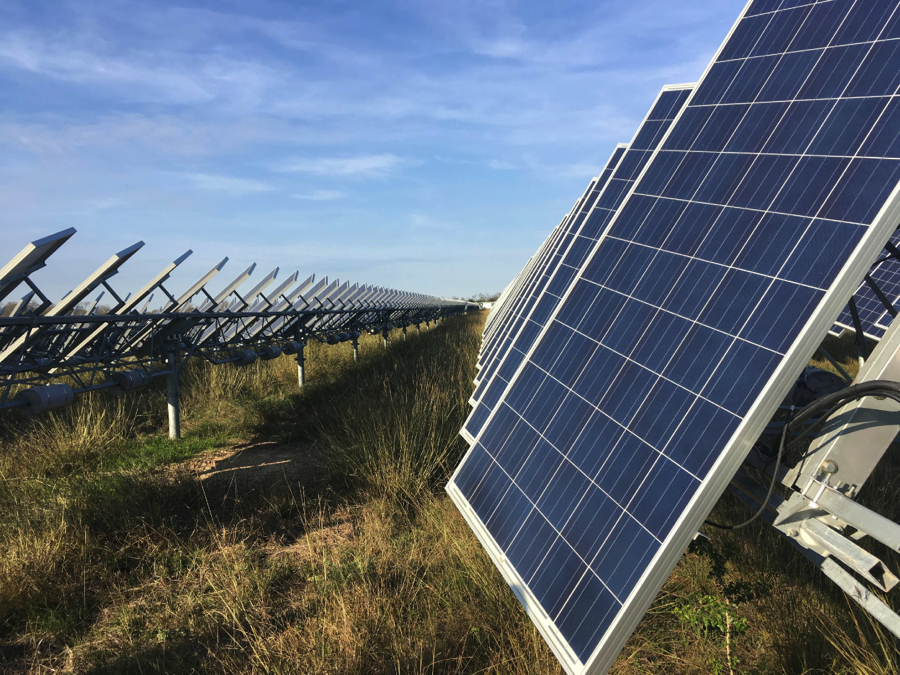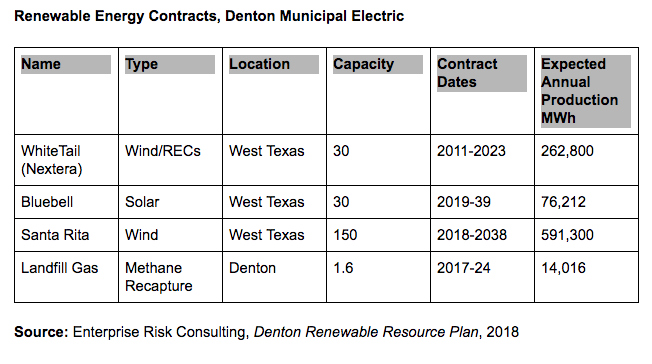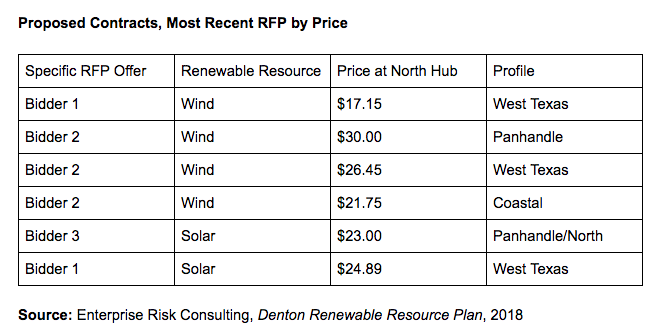By Cyrus Reed, Conservation Director

Just 16 months after Denton City Council adopted a power plan that directed the city’s utility to achieve at least 70% of its electricity from renewable energy by 2019, a new proposal from an independent consulting firm says that getting Denton to 100% renewable energy might be easier and more affordable than city leaders had been led to believe.
Community members and a coalition of organizations (including the Sierra Club), had previously told the City Council they should more carefully assess additional generation resource options, including 100% renewable energy, before committing to building new power plants run on natural gas. But now there is a firm with impeccable credentials to back up the recommendation.
Enterprise Risk Consulting (ERC), LLC, recently worked with Georgetown Utilities to help them go 100% renewable and it now recommends that Denton commit to either a 100% by 2020 plan or a slightly less ambitious 100% by 2024 plan (if President Trump decides to impose tariffs on imported solar panels which could lead to a short-term increase in solar prices). In either case, at a well-attended City Council meeting on Oct. 24, ERC representatives told Mayor Chris Watts and Council members that speeding up the City’s previous renewable energy goal was not only good for the environment but also smart for business and ratepayers.
ERC’s proposal also reiterated previous recommendations that Denton Municipal Electric (DME) end its reliance on the Gibbons Creek coal plant by September 2018, and that the new natural gas plants slated to be used in the Summer of 2018 could be used sparingly as a hedge when local electricity prices rise significantly. In fact, DME leadership had expected that the new natural gas plants would be used about 30% of the time, earning money for the utility, but ERC found that they might only be used just 12-20% of the time and generally only during high-priced hours.
Wonk Alert:
All The Clean Details… If You Want Them
[Editor’s Note: If you’re not into energy contracts, you can skip ahead to Denton City Council - How Did We Get Here?.]![]()
To gather information for the proposal, ERC used Denton’s most recent Request-for-Proposals for renewable energy, existing contracts, and data from ERCOT on energy prices, congestion revenues, and natural gas future prices, to look at both the current goals endorsed by City Council and a more ambitious timeline for achieving 100% renewable energy.
The firm found that the renewable energy contracts already in place would provide 44% of Denton’s expected annual load of 1,555,000 MWh if they did not count one of the contracts that is achieved through Renewable Energy Credit purchases, and 61% if they did. Based on their analysis, they recommended contracting an additional 400,000 MWh of renewable generation by 2019 to reach at least 70%, and a similar amount in 2020 to reach 100% renewable energy. A more gradual option would space the renewable purchases in 2020 over several years to get to the 100% by 2024.
Since Denton already has significant West Texas wind through the Santa Rita contract, ERC recommended DME to contract 90-200 MW of solar over the coming years and 75-200 MW of coastal and/or north wind to balance their portfolio. solar installations and coastal wind produce more energy during the day, while West Texas wind is generally favorable for night-time production.
In addition, ERC recommended that DME utilize a financial hedge known as Congestion Right Revenues and Point-to-Point Obligations to ensure they do not need to overbuy from the energy market to meet their loads since market purchases can be expensive. Finally, while outside their initial scope, the firm recommended that City Council and DME explore ways to lower energy purchases through demand-side management like energy efficiency, energy storage, and onsite solar.

Denton City Council: How Did We Get Here?
If you follow local politics, you’re probably asking yourself: didn’t Denton City Council just adopt the Renewable Denton Plan on a controversial 4-3 vote in 2016, which authorized 220 MW of new natural gas plants? Yes, it did.
But a lot has happened since then.
Several city and utility officials resigned or were put on leave due to questionable practices in the awarding of the contracts related to the new natural gas plants.
Long-time DME General Manager Phil Williams resigned, and he was essentially the main architect of the Renewable Denton Plan.
Citizens continued to question why Denton couldn’t move quicker on renewables and why so much new natural gas was needed, even as the utility looked to phase out their use of the currently mothballed Gibbons Creek coal plant.
While the new natural gas plants are already under construction, City Council felt that it was time to take another look at the plan they passed last year and the assumptions that led to its adoption. ERC’s analysis poked repeated holes in the Brattle Group analysis that endorsed the Renewable Denton Plan. ERC confirmed many of the conclusions reached by the Sierra Club in its own analysis, finding that 100% renewable energy, or a different plan that relied on renewables, power market purchases, and energy storage, were cheaper, better options than relying on new natural gas plants.
Wonk Alert:
Wait, How Can You Be 100% Renewable AND Own Natural Gas Plants?![]()
Here’s the truth about the electric market. Within Texas’s energy-only market in the ERCOT (Electric Reliability Council of Texas) grid, every generator puts electrons into the transmission system to match the energy consumed by residential, commercial, and industrial customers. However, if you’re a utility like DME, there is no guarantee that the electrons you contract for, such as through a long-term agreement with a wind or solar developer, or even those you own, such as a local natural gas plant, will actually be the electrons providing you with the power you need.
Therefore, the goal for Denton (or Georgetown or Austin) to get to a certain percentage of renewables is generally measured over the course of a year. In other words, take your total energy consumed, and then divide it by the total amount of energy produced by the renewables you own or contract for, and if it matches or exceeds your consumption, you have met the 100% goal. This means that even though Georgetown is slated to reach its 100% renewable energy goal with its latest solar contract, there will still be times when it purchases electricity from the market, which may come from coal, natural gas, or nuclear plants, but at other times, it will over-produce and send renewable energy into the market.
So yes, the new natural gas plants in Denton’s service area will likely go online and run on occasion, but they will run much less often than the previous leadership at DME and their hand-picked consultant, the Brattle Group, had predicted.
What’s Next?
ERC is scheduled to present a more detailed implementation and best practices plan in the coming weeks and Denton City Council should adopt the recommended 100% renewable goal, either by 2020 or on or before 2024 if Trump decides to raise solar tariffs significantly. Citizens should urge the City Council to make it clear that the current contract with NextERA, which is based on buying Renewable Energy Credits for 30 MW, should not count toward this goal since it is not completely tied to a particular source of renewable energy. In addition, as Denton moves to sign additional solar and wind contracts in the coming years, residents should demand that the utility and City devote time and effort to demand-side programs, including but not limited to:
A more robust demand-response program that would encourage residential, commercial, and industrial consumers to lower and shift peak energy use that would save both them and the utility money;
A community solar and/or community solar plus energy storage project, such as those recently implemented by CPS Energy, Austin Energy, Pedernales Electric Cooperative, and CoServ Electric Cooperative, that would allow residents without good roof space or enough funds for their own solar rooftop to participate directly in a local solar project;
A weatherization program to help low and middle-income home and apartment residents reduce costs on their electric bills;
Continued expansion of solar rebates to help homeowners and apartment owners put solar on their roofs.
By moving more quickly towards 100% renewable energy and expanding demand-side projects, Denton has the opportunity to reduce air pollution from fossil fuels, create new jobs, and expand the use of renewable resources, while retiring a dirty, old coal plant and reducing dependence on natural gas.
Tell Denton City Council you agree and support the plan to go 100% renewable faster.